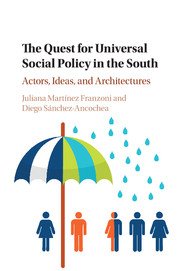Book contents
- Frontmatter
- Contents
- List of Figures
- List of Tables
- Acknowledgements
- List of Abbreviations
- Part I Universalism in the South
- Part II A Comparative Study of Policy Architectures
- Part III Building Universalism in Costa Rica
- 5 The Foundations of the Policy Architecture in the 1940s
- 6 Moving Further Towards Unification in the 1970s
- 7 Contradictory Moves under Market Pressures since the 1980s
- Part IV Conclusions
- References
- Index
5 - The Foundations of the Policy Architecture in the 1940s
from Part III - Building Universalism in Costa Rica
Published online by Cambridge University Press: 10 November 2016
- Frontmatter
- Contents
- List of Figures
- List of Tables
- Acknowledgements
- List of Abbreviations
- Part I Universalism in the South
- Part II A Comparative Study of Policy Architectures
- Part III Building Universalism in Costa Rica
- 5 The Foundations of the Policy Architecture in the 1940s
- 6 Moving Further Towards Unification in the 1970s
- 7 Contradictory Moves under Market Pressures since the 1980s
- Part IV Conclusions
- References
- Index
Summary
Introduction
In the previous two chapters, we showed Costa Rica's comparative success in enacting a unified policy architecture, capable of delivering universal outputs. This accomplishment did not happen overnight but instead took place in successive stages of incremental change. In this and the next two chapters we address policy drivers behind each stage, to then compare our conclusions with the experience of the other three countries in Chapter 8.
Our analysis begins in 1941 with the creation of social insurance for health care and pensions. As discussed in the preceding chapter, this new program had features that largely shaped its subsequent trajectory. These included the provision of the same benefits to all workers (and later their families) and the incorporation of urban, relatively low-income earners first, and only later higher income earners – what we call a “bottom-up” expansion.
Electoral competition and progressive leadership were preconditions for the foundation of social insurance. The 1941 Presidential elections were dominated by debates on how to confront poverty and improve living standards for a majority of the Costa Rican population. The election of the first Christian-Democrat president was pivotal in reshaping debates about this “social question.” Yet these two variables do not adequately explain why the new government focused on social insurance or where the key characteristics of its architecture originated.
In this chapter we show that state actors drove the design, adoption, and implementation of Costa Rica's unique architecture. We highlight the role of a small group of experts who shared two characteristics. First, they had close access to top decision makers and received their full support. Second, all members of the group were involved in international policy networks and much of their influence came from their access to international experiences, ideas, and models – like similar groups of policy experts in more recent times (Weyland, 2004). Their participation in international organizations, conferences, and publications played an important role in spreading and adapting global norms domestically (see Sugiyama 2011 for an account of similar processes since the 2000s).
State actors – both this group of experts and also political leaders – also succeeded in managing vetoes. Although the absence of a large industrial labor force in Costa Rica may have inhibited strong social actors (Segura-Ubiergo 2007) social pressures still existed.
- Type
- Chapter
- Information
- The Quest for Universal Social Policy in the SouthActors, Ideas and Architectures, pp. 107 - 122Publisher: Cambridge University PressPrint publication year: 2016



